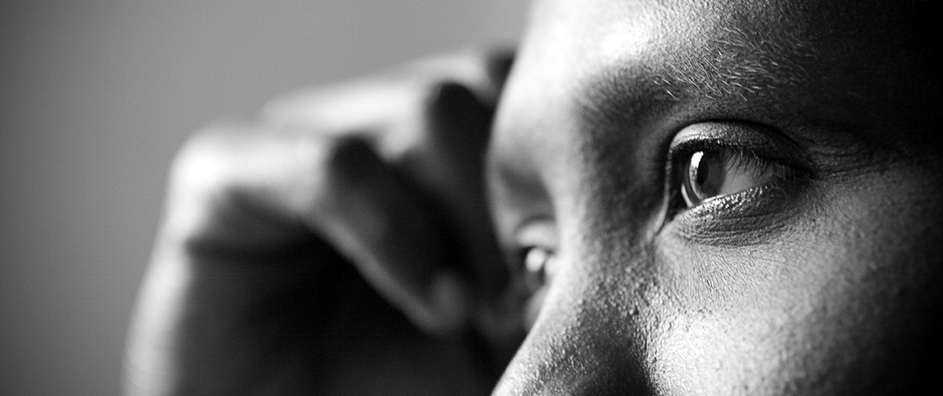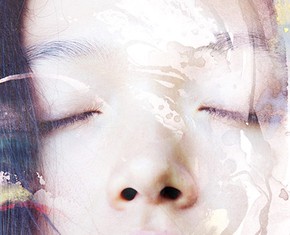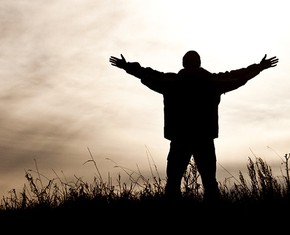The views expressed in our content reflect individual perspectives and do not represent the authoritative views of the Baha'i Faith.
Belief consists in accepting the affirmations of the soul; unbelief, in denying them. – Ralph Waldo Emerson
Life is real! Life is earnest!
And the grave is not its goal;
Dust thou are, to dust thou returnest,
Was not spoken of the soul.
― Henry Wadsworth LongfellowMan has no Body distinct from his soul; for that called Body is a portion of a Soul discerned by the five senses, the chief inlets of Soul in this age. – William Blake
What’s the most ancient, most persistent, and most profound human belief? It’s the existence of an immortal soul.
Most of the great poets and philosophers believed deeply in the human soul. Do you?
If you do, you’re in good company. Many anthropologists theorize that the idea of the soul dates back more than 200,000 years, right about the same time they believe human consciousness began to emerge. As soon as we had language, they think, humans began putting the concept of a soul into words.
At that point in early human history, our race experienced a cultural explosion, expressed in art, clothing, language and the beginnings of religion. We painted caves, ornamented ourselves with symbols, decorated our tombs with religious figures and representations and clearly began to think in an abstract way. At that point in our development, we had moved beyond the necessities of food and shelter, and had begun to utilize our leisure time, our creative impulses and our untapped brain power to transcend the merely physical and begin contemplating the spiritual.
But how did we first develop the idea of an immortal soul, or any kind of human spirituality?
It probably started with the mystery of death.

Unlike any animal, human beings have the capacity to project their minds forward into the future and contemplate their own demise. Once we knew we could die, scientists have theorized, we began to understand and believe that some innate part of us lived on. That immortal spirit or soul, exemplified in early cave art and symbolic tomb carvings, naturally emerged from our own discovery of consciousness and self-awareness.
Maybe that explains why every culture, even today, has some concept of a soul or spirit that outlives the body. No matter where they come from, humans seem compelled to think of themselves as something more than the sum of our biological parts.
Contemporary polls show that between 65-80% of the world’s people say they believe in the existence of the soul. Regardless of religion or the lack of it, the overwhelming majority of us accept that something spiritual, some innate inner essence we all possess, both animates us while our bodies live, and lives on after our bodies die.
The Baha’i Faith, like all of the other great global religions, definitely shares that belief:
While the body changes from one condition to another, there is no change or transformation for the soul. For example, the youthful form of the human body will become old, but the soul, remains the same; the body becomes weak, but the soul does not become weak; the body becomes defective or paralyzed, but for the soul, there is no change. How often a member may be amputated from a body, but the soul remains the same, and never changes. Therefore, while the body undergoes changes, the soul does not change. And because the soul does not change, it is immortal. For the pivot or the main thing in mortality is change and transformation.
In the world of dreams, the human body lays helpless; its powers lacking; the eyes do not see; the ears do not hear, and the body does not move. But the soul sees, hears, travels and solves problems. Therefore, it becomes evident, that by the death of the body, the soul does not die; in the passing away of the body, the soul does not perish; when the body sleeps, the soul does not sleep, nay, rather, it comprehends and discovers things; it flys and travels.
The body may be here, but the soul can be present in the east or west. While in the west, it manages the affairs of the east, and, in the east, it discovers the things of the west. It organizes and runs the vital affairs of nations. While the body is in one place, the soul travels in different countries and continents. In Spain, yet, it discovers America. Thus, the power and influence, which belong to the soul, are lacking in the body. The body does not see, but the soul sees and explores. Therefore, its life does not depend upon the body. – Abdu’l-Baha, Star of the West, Volume 9, pp. 307-308.
In this short series of essays, we’ll explore the concept of the soul, and ask the questions everyone asks themselves about their inner spirit: How do I prove it exists? Where is it? What does it mean for my life here in this physical universe? What does it mean for my life after I die?
Next: How Our Premonitions Prove We Have Souls
You May Also Like
Comments

















“Our birth is but a sleep and a forgetting:
The Soul that rises with us, our life's Star,
Hath had elsewhere its setting,
And cometh from afar:
Not in entire forgetfulness,
And not in utter nakedness,
But trailing clouds of glory do we come”
― William Wordsworth
* * * * *
“The hidden well-spring of your soul must needs rise and run murmuring to the sea;
And the treasure of your infinite depths would be revealed to your eyes.
But let there be no scales to weigh your unknown treasure;
And seek not ...the depths of your knowledge with staff or sounding line.
For self is a sea boundless and measureless.
Say not, “I have found the truth,” but rather, “I have found a truth.”
Say not, “I have found the path of the soul.” Say rather, “I have met the soul walking upon my path.”
For the soul walks upon all paths.
The soul walks not upon a line, neither does it grow like a reed.
The soul unfolds itself, like a lotus of countless petals.”
― Kahlil Gibran, The Prophet
* * * * *
“All you can ever achieve is a sense of your soul. You gain little glimpses of its light, colors, and contours. You feel the inspiration of its possibilities and the wonder of its mysteries.”
― John O'Donohue, Anam Cara: A Book of Celtic Wisdom
* * * * *
“Forgiveness is healing—everything is energy—thoughts create—we are all connected—what you resist persists—true love never dies—the soul’s immortality is the only true immortality—”
― Alyson Noel, Everlasting
* * * * *
“My music is the spiritual expression of what I am — my faith, my knowledge, my being...When you begin to see the possibilities of music, you desire to do something really good for people, to help humanity free itself from its hangups...I want to speak to their souls.”
― John Coltrane
* * * * *
“Life is real! Life is earnest!
And the grave is not its goal;
Dust thou are, to dust thou returnest,
Was not spoken of the soul.”
― Henry Wadsworth Longfellow, Voices of the Night
* * * * *
“Remember, we Christians think man lives for ever. Therefore, what really matters is those little marks or twists on the central, inside part of the soul which are going to turn it, in the long run, into a heavenly or a hellish creature.”
― C.S. Lewis, Mere Christianity
* * * * *
“Man has no Body distinct from his soul; for that called Body is a portion of a Soul discerned by the five senses, the chief inlets of Soul in this age.”
― William Blake
* * * * *
“If I discover within myself a desire which no experience in this world can satisfy, the most probable explanation is that I was made for another world.”
― C.S. Lewis
* * * * *
“There is one spectacle grander than the sea, that is the sky; there is one spectacle grander than the sky, that is the interior of the soul.”
― Victor Hugo, Les Misérables
* * * * *
“There needs not a great soul to make a hero; there needs a god-created soul which will be true to its origin; that will be a great soul!”
― Thomas Carlyle, On Heroes, Hero Worship and the Heroic in History
* * * * *
“My soul, where are you? Do you hear me? I speak, I call you - are you there? I have returned, I am here again. I have shaken the dust of all the lands from my feet, and I have come to you, I am with you. After long years of long wandering, I have come to you again. Should I tell you everything I have seen, experienced, and drunk in? Or do you not want to hear about all the noise of life and the world? But one thing you must know: the one thing I have learned is that one must live this life. Do you still know me? How long the separation lasted! Everything has become so different. And how did I find you? How strange my journey was! What words should I use to tell you on what twisted paths a good star has guided me to you? Give me your hand, my almost forgotten soul. How warm the joy at seeing you again, you long disavowed soul. Life has led me back to you. Let us thank the life I have lived for all the happy and all the sad hours, for every joy, for every sadness. My soul, my journey should continue with you. I will wander with you and ascend to my solitude.”
― C.G. Jung, The Red Book: Liber Novus
In the Theravada tradition, suffering arises when one identifies with or clings to an aggregate. Suffering is extinguished by relinquishing attachments to aggregates.
The Mahayana ...tradition further puts forth that ultimate freedom is realized by deeply penetrating the nature of all aggregates as intrinsically empty of independent existence.
Outside of Buddhist didactic contexts, "skandha" can mean mass, heap, pile, gathering, bundle or tree trunk.[5][c]
According to Ṭhānissaro Bhikkhu, the buddha gave a new meaning to the term "khanda":
Prior to the Buddha, the Pali word khandha had very ordinary meanings: A khandha could be a pile, a bundle, a heap, a mass. It could also be the trunk of a tree. In his first sermon, though, the Buddha gave it a new, psychological meaning, introducing the term clinging-khandhas to summarize his analysis of the truth of stress and suffering. Throughout the remainder of his teaching career, he referred to these psychological khandhas time and again.
The sutras describe five aggregates:
"form" or "matter" (Skt., Pāli रूप rūpa; Tib. gzugs): external and internal matter. Externally, rupa is the physical world. Internally, rupa includes the material body and the physical sense organs.
"sensation" or "feeling" (Skt., Pāli वेदना vedanā; Tib. tshor-ba): sensing an object as either pleasant, unpleasant or neutral.
"perception", "conception", "apperception", "cognition", or "discrimination" (Skt. संज्ञा saṃjñā, Pāli सञ्ञा saññā, Tib. 'du-shes): registers whether an object is recognized or not (for instance, the sound of a bell or the shape of a tree).
"mental formations", "impulses", "volition", "fabrications" or "compositional factors" (Skt. संस्कार saṃskāra, Pāli सङ्खार saṅkhāra, Tib. 'du-byed): all types of mental habits, thoughts, ideas, opinions, prejudices, compulsions, and decisions triggered by an object.
"consciousness" or "discernment" (Skt. विज्ञान vijñāna, Pāli विञ्ञाण viññāṇa, Tib. rnam-par-shes-pa):
In the Nikayas/Āgamas: cognizance, that which discerns.
In the Abhidhamma: a series of rapidly changing interconnected discrete acts of cognizance.
In some Mahayana sources: the base that supports all experience.
The Buddhist literature describes the aggregates as arising in a linear or progressive fashion, from form to feeling to perception to mental formations to consciousness. In the early texts, the scheme of the five aggregates is not meant to be an exhaustive classification of the sentient being. Rather it describes various aspects of the way an individual manifests.
The anatta doctrine is not a kind of materialism. Buddhism does not deny the ...existence of "immaterial" entities, and it (at least traditionally) distinguishes bodily states from mental states. Thus, the conventional translation of anatta as "no-soul" can be confusing. If the word "soul" simply refers to an incorporeal component in living things that can continue after death, then Buddhism does not deny the existence of the soul. Instead, Buddhism denies the existence of a permanent entity that remains constant behind the changing corporeal and incorporeal components of a living being. Just as the body changes from moment to moment, so thoughts come and go. And there is no permanent state underlying the mind that experiences these thoughts, as in Cartesianism. Conscious mental states simply arise and perish with no "thinker" behind them. When the body dies, Buddhists believe the incorporeal mental processes continue and are reborn in a new body. Because the mental processes are constantly changing, the being that is reborn is neither entirely different from, nor exactly the same as, the being that died. However, the new being is continuous with the being that died – in the same way that the "you" of this moment is continuous with the "you" of a moment before, despite the fact that you are constantly changing.
Buddhist teaching holds that a notion of a permanent, abiding self is a delusion that is one of the causes of human conflict on the emotional, social, and political levels. They add that an understanding of anatta provides an accurate description of the human condition, and that this understanding allows us to pacify our mundane desires.
Various schools of Buddhism have differing ideas about what continues after death. The Yogacara school in Mahayana Buddhism said there are Store consciousness which continue to exist after death. In some schools, particularly Tibetan Buddhism, the view is that there are three minds: very subtle mind, which does not disintegrate in death; subtle mind, which disintegrates in death and which is "dreaming mind" or "unconscious mind"; and gross mind, which does not exist when one is sleeping. Therefore, gross mind less permanent than subtle mind, which does not exist in death. Very subtle mind, however, does continue, and when it "catches on", or coincides with phenomena, again, a new subtle mind emerges, with its own personality/assumptions/habits, and that entity experiences karma in the current continuum.
Plants were said to be non-sentient (無情), but Buddhist monks are required to not cut or burn trees, because some sentient beings rely on them. Some Mahayana monks said non-sentient beings such as plants and stones have buddha-nature.
Certain modern Buddhists, particularly in Western countries, reject—or at least take an agnostic stance toward the concept of rebirth or reincarnation, which they view as incompatible with the concept of anatta. Stephen Batchelor discusses this issue in his book Buddhism Without Beliefs. Others point to research that has been conducted at the University of Virginia as proof that some people are reborn.